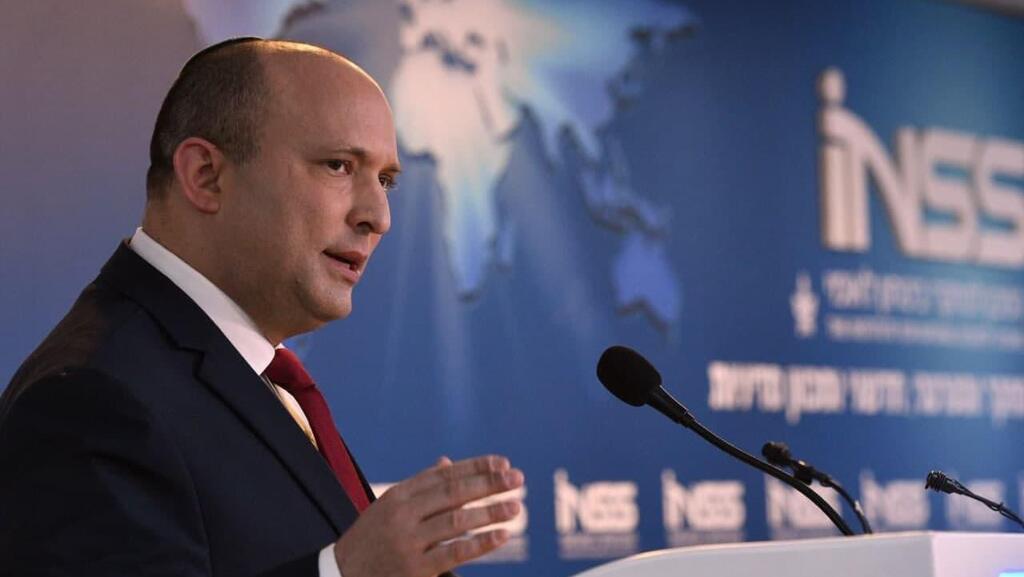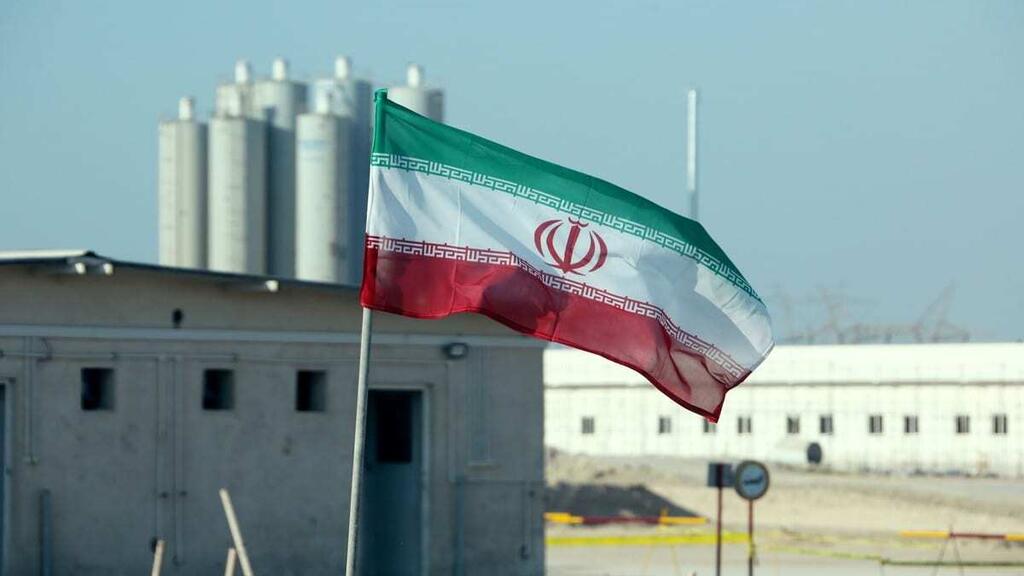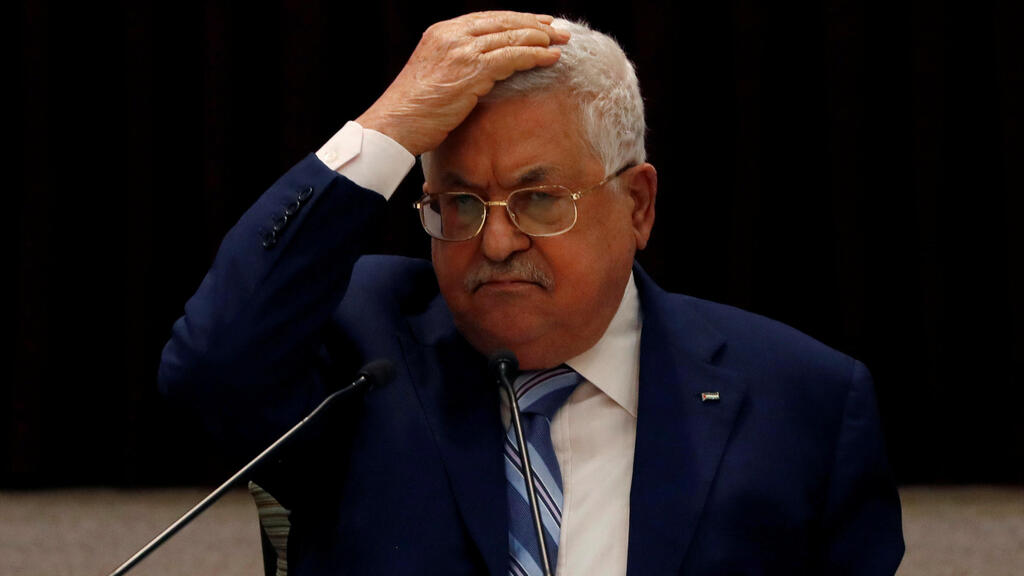Prime Minister Naftali Bennett and senior members of his cabinet have a strategic vision that is supposed to endow Israel with principles and tools to tackle its most burning security issues.
The government's vision is sound and is in fact based on in-house technological developments since Bennett understands that when it comes to security, Israel should lower its expectations and demands from the U.S. administration.
4 View gallery


Prime Minister Naftali Bennett speaking at the 15th annual conference of the Institute for National Security Studies
(Photo: GPO)
He knows that instead of relying on Washington, we should rely instead on what we can develop and achieve on our own, all while strengthening cooperation with other countries in the region with which we have a dialogue based on common interests.
And while this vision does harbor potential in and of itself, it has two glaring flaws: first is Bennett’s unhealthy tendency to instill the feeling in his listeners that his plans — as benevolent as they may seem — are close to being realized.
In his Tuesday speech at the annual conference of the Institute for National Security Studies, Bennett revealed Israel’s intention to roll out a laser-based interception system within a year — despite defense officials estimating such a system won't become operational before 2025.
Closely examining his speech, one can clearly see Bennett did not intend to cheat or mislead the public. He is working tirelessly to devise a defense strategy and draw a road map that in a few years — after he most probably isn't prime minister anymore — could lead weaken Iran and its proxies massed along our borders.
4 View gallery


Streaks of light are seen as Israel's Iron Dome intercepts rockets launched from the Gaza Strip during the 2021 war
(Photo: Reuters)
It seems as though, he tried, and maybe even succeeded, in sweeping his listeners with his over-optimism, which serves him and his image as a politician.
The media, meanwhile, feverishly covered Bennett’s somewhat overzealous promise that — in about a year — Israel will be surrounded by an impenetrable laser wall that will protect it from any and all threats, all while slashing Iron Dome’s notoriously high operation costs.
That is without mentioning Bennett’s non-viable strategy for a comprehensive confrontation with Iran without Washington's aid or consent.
Led by Defense Minister Benny Gantz and IDF Chief of Staff Aviv Kochavi, the defense establishment and the military have already begun practical preparations for carrying out several operations aimed at preventing Iran from achieving its nuclear ambitions.
These specific preparations actually began during Benjamin Netanyahu’s previous government. Bennett's vision, though, goes far beyond denying Tehran nuclear weapons.
Bennett wishes to “cut off the snake’s head." That is, to threaten and weaken the regime in Tehran "through economic means, through cyber as well as overt and covert actions" to not only block Iran on its path to nuclear arms but also weaken and paralyze its proxies' abilities to harm Israel.
Bennett’s comprehensive and inspirational strategic outlook on Iran has yet to get the green light from his cabinet, nor was it even presented before it yet.
Even if his strategy does receive formal approval — it remains unclear, even to those in the know about Israel's true capabilities, how Bennett intends to realize his strategy to challenge and weaken the regime in Tehran.
After all, there is still a chance that the negotiations in Vienna with the superpowers will result in a new nuclear agreement that will inject billions of dollars into the Islamic Republic's coffers and of its Revolutionary Guards' Quds Force.
At the end of Bennett's Tuesday, we've learned about a serious and worrisome blind spot in his security doctrine — his dangerous disregard for the Palestinian issue, which a significant portion of the Israeli public considers (and rightly so in my opinion) an existential threat to Israel's Jewish and democratic character.
"The conflict with our neighbors, which once defined nearly every of our contact with the world, is still there. But it defines us much less now. Why? Because we have something to give,” said Bennett, who vehemently believes Israel’s technological capabilities will grant him and his officials a royal welcome in every palace in the Gulf.
Bennett and his government are trying to strengthen the leadership of the secular Fatah movement to prevent Hamas' Islamists from taking over the Palestinian Authority in the West Bank, on the day after President Mahmoud Abbas steps down.
They are also trying to placate the Gaza public through economic benefits and with help from the Egyptians and Qataris, all while buying peace in the West Bank ahead of Abbas’ retirement and the consequent chaos that every single defense establishment official knows will ensue immediately.
Bennett, on his part, has simply made peace with the idea that the Palestinian issue is here to stay with no solution on the horizon.
If that's not enough, the prime minister's official and public strategic vision as presented on Tuesday does not make a single mention the threat posed to our future as a sovereign state and to our personal security as citizens by the lack of governance and law enforcement shortcomings in the Arab and ultra-Orthodox sectors.
It is not hard to see Bennett's ideological and political considerations in choosing to ignore these two critical issues.
but the binational reality in the West Bank is becoming gradually irreversible while the issue of lawless, autonomic enclaves within Israel itself also worsens.



